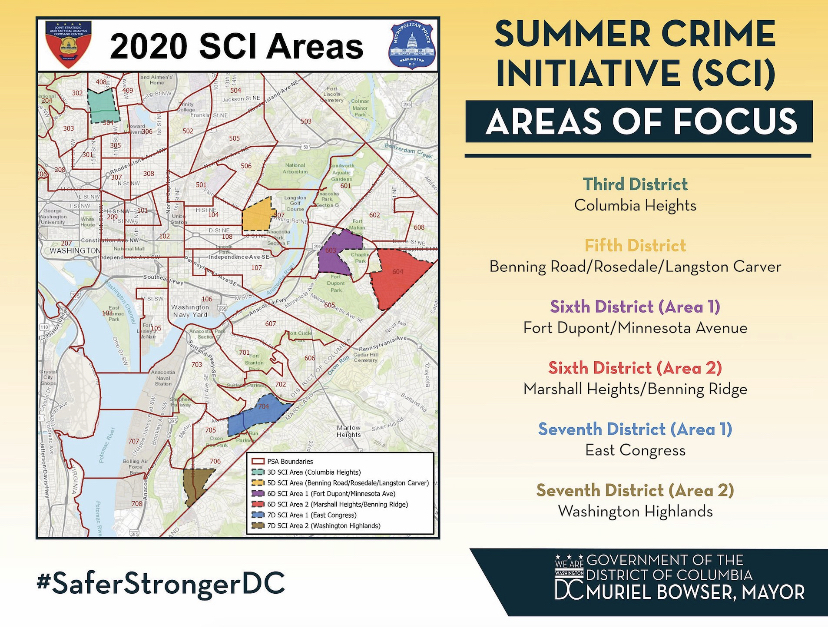[ad_1]
By Micha Green
AFRO D.C. Editor
[email protected]
While Mayor Muriel Bowser’s current COVID-19 response involves a stay-at-home order and closure of non-essential businesses through May 15, statistics in the District of Columbia do not support that re-opening target, with more than 5,100 residents having tested positive for the novel coronavirus since the beginning of the outbreak in the nation’s capital.
As of May 3, Bowser reported 5,170 total positive cases in the District, 258 lives lost and 666 recoveries. That leaves more than 4,200 residents still recovering from the potentially fatal disease.

Despite the need for social distancing, Bowser is still committed to the mission of ensuring D.C. streets are safe during the summer. She implied there would be a continued need for social distancing in the summer months, as she announced her 2020 Summer Crime Initiative (SCI) as part of #SaferStrongerDC.
“This year will require us to be more creative in how we do community engagement while maintaining social distance. I know that with your support- we’ll create a safe and healthy summer for all our residents,” Bowser wrote on Twitter.
According to the Mayor’s Summer Crime Prevention Initiative (SCPI) website, each summer since 2010, the Metropolitan Police Department (MPD) has identified four to six areas that have experienced a high volume of violent crimes, particularly homicides and other gun-related cases.
“Throughout the summer months, MPD then focuses all available resources, utilizes the latest crime-fighting technology and calls upon partner agencies and organizations to assist in a coordinated effort to eliminate violent crime in these areas,” according to the SCPI website.
The SCPI program generally runs from May 1- August 31.
Early last summer, Bowser was on a crusade to combat gun violence, particularly after the deaths of local youth, such as 15-year-old Maurice Scott.
“When we look at the data around gun violence, the numbers are devastating. And what we must never forget is that behind every number is a real person, and behind every victim is a network of family and friends who are left heartbroken and traumatized,” Bowser wrote in a letter to Washingtonians June 2019.
As May is here and temperatures are rising, Bowser and the Chief of the Metropolitan Police Department Peter Newsham spoke out on their commitment to combatting crime in the District during the COVID-19 pandemic with the Summer Initiative Program.
“Metropolitan Police Department (MPD) is committed to reducing violent crime in our city and this year is no different. The successful program we’ve had is our Summer Initiative Program and we intend on doing that again, like we have in past years, beginning on May 1,” said Chief Newsham in a video statement.
Newsham said last year’s SCI was a success.
“If you want to see some of the success we’ve had, you can look to last year where we were able to reduce homicide rates by nearly 44 percent and assaults with a dangerous weapon by 22 percent. We’re going to be committed to reducing violent crime and building trust in our city and that’s why we’re holding our Summer Crime Initiative,” the Police Chief said.
The mayor has identified SCI Areas of Focus throughout the city, including:
- Third District: Columbia Heights
- Fifth District: Benning Road/ Rosedale/ Langston Carver
- Sixth District (Area 1): Fort Dupont/ Minnesota Avenue
- Sixth District (Area 2): Marshall Heights/ Benning Ridge
- Seventh District (Area 1): East Congress
- Seventh District (Area 2): Washington Highlands
In a video utilizing a speech with old footage, the mayor emphasized the need for community resources as a way of combatting summer crimes in the District.
“In Washington, D.C. we understand that crime and violence prevention is about more than just policing. It is reflected in our approach during the summer as well,” the Mayor said. “It is about keeping young people engaged and safe. It is about connecting residents with behavioral health support and resources and making sure we connect residents with employment opportunities as well.”
[ad_2]
Source link
